英语听力作业
五年英语下册听力暑假作业
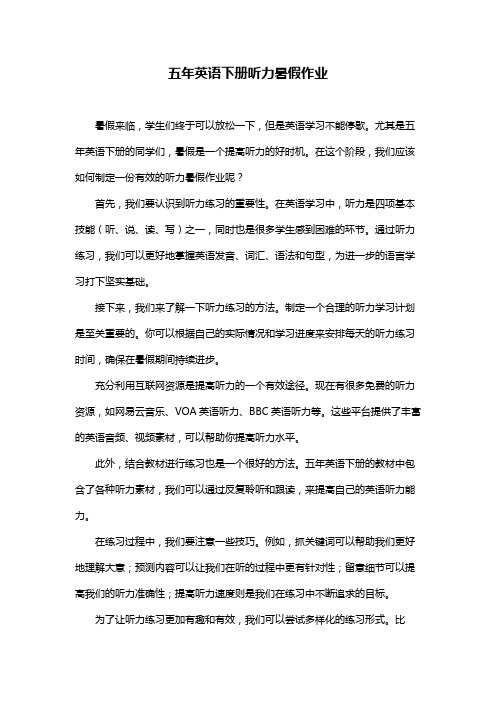
五年英语下册听力暑假作业
暑假来临,学生们终于可以放松一下,但是英语学习不能停歇。
尤其是五年英语下册的同学们,暑假是一个提高听力的好时机。
在这个阶段,我们应该如何制定一份有效的听力暑假作业呢?
首先,我们要认识到听力练习的重要性。
在英语学习中,听力是四项基本技能(听、说、读、写)之一,同时也是很多学生感到困难的环节。
通过听力练习,我们可以更好地掌握英语发音、词汇、语法和句型,为进一步的语言学习打下坚实基础。
接下来,我们来了解一下听力练习的方法。
制定一个合理的听力学习计划是至关重要的。
你可以根据自己的实际情况和学习进度来安排每天的听力练习时间,确保在暑假期间持续进步。
充分利用互联网资源是提高听力的一个有效途径。
现在有很多免费的听力资源,如网易云音乐、VOA英语听力、BBC英语听力等。
这些平台提供了丰富的英语音频、视频素材,可以帮助你提高听力水平。
此外,结合教材进行练习也是一个很好的方法。
五年英语下册的教材中包含了各种听力素材,我们可以通过反复聆听和跟读,来提高自己的英语听力能力。
在练习过程中,我们要注意一些技巧。
例如,抓关键词可以帮助我们更好地理解大意;预测内容可以让我们在听的过程中更有针对性;留意细节可以提高我们的听力准确性;提高听力速度则是我们在练习中不断追求的目标。
为了让听力练习更加有趣和有效,我们可以尝试多样化的练习形式。
比
如,参加英语角或线上英语社群,与外国朋友交流,观看英语电影、纪录片等。
暑假是提高英语听力的好时机,只要我们坚持每天练习,充分利用各种资源,掌握一定的技巧,相信大家的英语听力水平一定会有所提高。
三年级英语(上册)活页作业听力材料

三年级英语(上册)活页作业听力材料Unit 1 : Hello一、选出你所听到的单词,将序号填在括号内。
1.pencil2.book3.eraser4.goodbye5.sharpener二、听录音,判断对错。
1. goodbye2. Show me your ruler.3.go to school.4.I’m mike.5.I have a book.三、听音排序。
1. Hello!2. Hi!3. This is John.4. Nice to meet you.5. Let’s go to school!6. OK.Unit 2:Look at Me.一、听录音,选出你听到的单词或句子,将其编号写在括号里。
1.ear2.arm3.head4. See you!5.Where is your mouth?二、听录音,做判断。
与录音相符画,不符画。
1.Hello! I’m Mike.This is my nose.2.Hello! I’m Wu Yifan.This is my arm.3.Hello! My name is John.Look at my ear.4.Hi! My name’s Sarah.Look at my head.5.Touch your eye,please! Bai Ling.6.Chen Jie,touch your face,please!三、听音选择。
1. This is my face.2 Touch your eye 3. Look at my finger.4. I have 2 fingers5.Where is your foot6.Nice to meet you.Unit 3:Let’s Paint!一、听录音,选单词。
1. .brown.2. orange3. pencil4. red5. where二、听录音,标序号。
1.My flag is red, white and blue.2.How are you ?3.Let’s paint!4.This is Miss White.5.I can see a rainbow.三、听录音,选出你所听到的句子的应答语.1.Good afternoon.2. How are you?3. Nice to meet you..4.Let’s go to school .5. Bye!期中练习题一、听一听,选一选。
交大英语听力作业答案
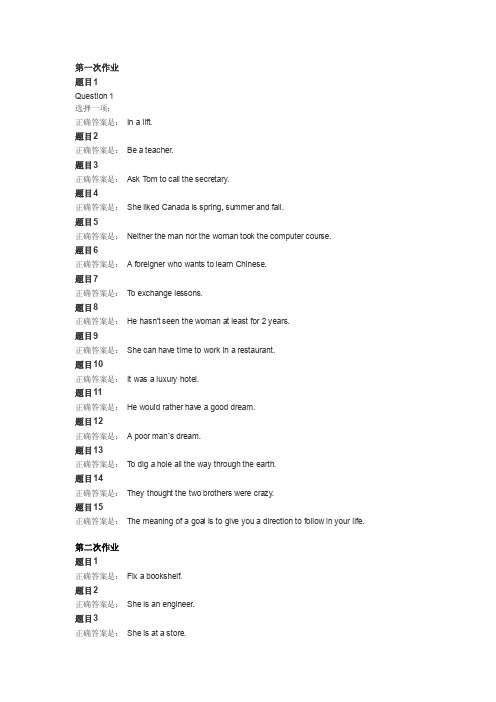
第一次作业题目1Question 1选择一项:正确答案是:In a lift.题目2正确答案是:Be a teacher.题目3正确答案是:Ask T om to call the secretary.题目4正确答案是:She liked Canada is spring, summer and fall.题目5正确答案是:Neither the man nor the woman took the computer course.题目6正确答案是:A foreigner who wants to learn Chinese.题目7正确答案是:T o exchange lessons.题目8正确答案是:He hasn't seen the woman at least for 2 years.题目9正确答案是:She can have time to work in a restaurant.题目10正确答案是:It was a luxury hotel.题目11正确答案是:He would rather have a good dream.题目12正确答案是:A poor man’s dream.题目13正确答案是:T o dig a hole all the way through the earth.题目14正确答案是:They thought the two brothers were crazy.题目15正确答案是:The meaning of a goal is to give you a direction to follow in your life.第二次作业题目1正确答案是:Fix a bookshelf.题目2正确答案是:She is an engineer.题目3正确答案是:She is at a store.题目4正确答案是:85.题目5正确答案是:She hasn't met the new teacher yet.题目6正确答案是:Doctor and patient.题目7正确答案是:Before leaving the office.题目8正确答案是:T ype his paper.题目9正确答案是:May.题目10正确答案是:T erribly.题目11正确答案是:Tried to get a job.题目12正确答案是:Simply a headache.题目13正确答案是:Because not all languages see the world the same way. 题目14正确答案是:Through languages.题目15正确答案是:Its cultural values.。
(0190)《英语听力三》(高)网上作业题及答案
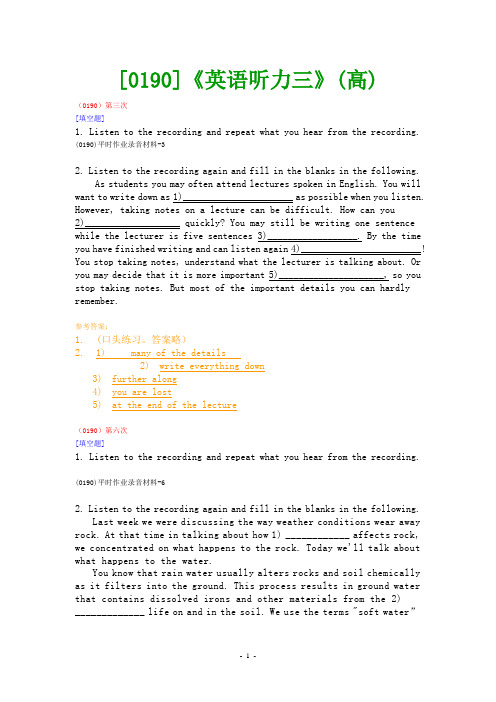
[0190]《英语听力三》(高)(0190)第三次[填空题]1. Listen to the recording and repeat what you hear from the recording. (0190)平时作业录音材料-32. Listen to the recording again and fill in the blanks in the following.As students you may often attend lectures spoken in English. You will want to write down as 1)______________________ as possible when you listen. However, taking notes on a lecture can be difficult. How can you2)___________________ quickly? You may still be writing one sentence while the lecturer is five sentences 3)__________________. By the time you have finished writing and can listen again 4)________________________! You stop taking notes, understand what the lecturer is talking about. Or you may decide that it is more important 5)_____________________, so you stop taking notes. But most of the important details you can hardly remember.参考答案:1.(口头练习。
英语听力作业
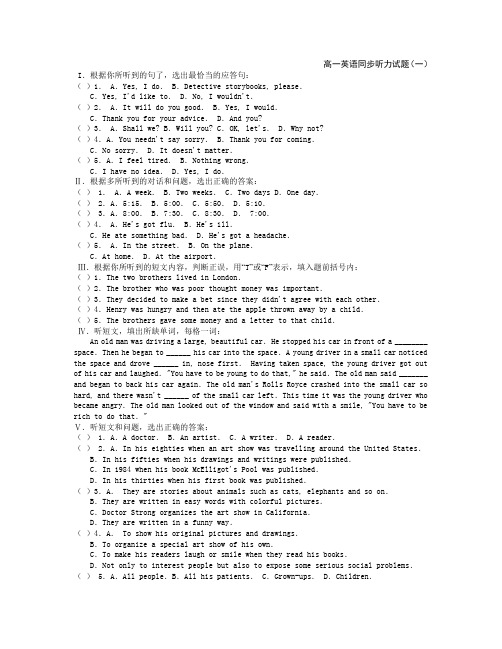
高一英语同步听力试题(一) I.根据你所听到的句了,选出最恰当的应答句:()1. A.Yes, I do. B.Detective storybooks, please.C.Yes, I'd like to. D.No, I wouldn't.()2. A.It will do you good. B.Yes, I would.C.Thank you for your advice. D.And you?()3. A.Shall we? B.Will you? C.OK, let's. D.Why not?()4.A.You needn't say sorry. B.Thank you for coming.C.No sorry. D.It doesn't matter.()5.A.I feel tired. B.Nothing wrong.C.I have no idea. D.Yes, I do.Ⅱ.根据多所听到的对话和问题,选出正确的答案:() 1. A.A week. B.Two weeks. C.Two days D.One day.() 2.A.5:15. B.5:00. C.5:50. D.5:10.() 3.A.8:00. B.7:30. C.8:30. D. 7:00.()4. A.He's got flu. B.He's ill.C.He ate something bad. D.He's got a headache.()5. A.In the street. B.On the plane.C.At home. D.At the airport.Ⅲ.根据你所听到的短文内容,判断正误,用“T”或“F”表示,填入题前括号内:()1.The two brothers lived in London.()2.The brother who was poor thought money was important.()3.They decided to make a bet since they didn't agree with each other.()4.Henry was hungry and then ate the apple thrown away by a child.()5.The brothers gave some money and a letter to that child.Ⅳ.听短文,填出所缺单词,每格一词:An old man was driving a large, beautiful car.He stopped his car in front of a ________ space.Then he began to ______ his car into the space.A young driver in a small car noticed the space and drove ______ in, nose first. Having taken space, the young driver got out of his car and laughed."You have to be young to do that," he said.The old man said _______ and began to back his car again.The old man's Rolls Royce crashed into the small car so hard, and there wasn't ______ of the small car left.This time it was the young driver who became angry.The old man looked out of the window and said with a smile, "You have to be rich to do that."Ⅴ.听短文和问题,选出正确的答案:() 1.A.A doctor. B.An artist. C.A writer. D.A reader.() 2.A.In his eighties when an art show was travelling around the United States. B.In his fifties when his drawings and writings were published.C.In 1984 when his book McElligot's Pool was published.D.In his thirties when his first book was published.()3.A. They are stories about animals such as cats, elephants and so on.B.They are written in easy words with colorful pictures.C.Doctor Strong organizes the art show in California.D.They are written in a funny way.()4.A. To show his original pictures and drawings.B.To organize a special art show of his own.C.To make his readers laugh or smile when they read his books.D.Not only to interest people but also to expose some serious social problems.() 5.A.All people.B.All his patients. C.Grown-ups. D.Children.高一英语同步听力试题(二)I 听下面5段对话。
小学五年级英语单元作业听力材料
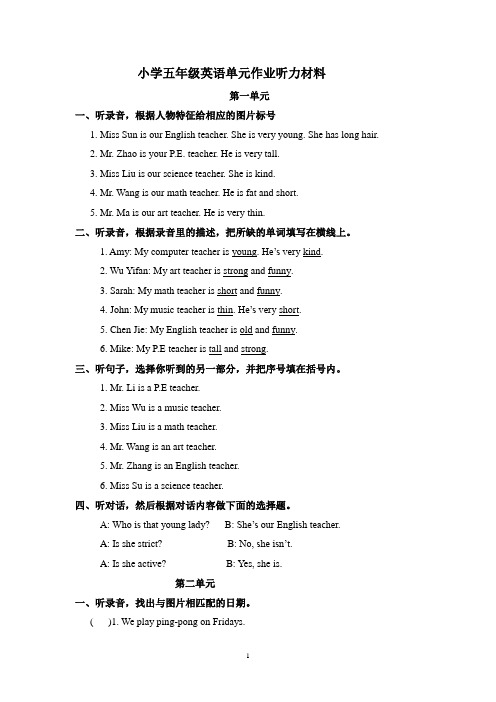
小学五年级英语单元作业听力材料第一单元一、听录音,根据人物特征给相应的图片标号1. Miss Sun is our English teacher. She is very young. She has long hair.2. Mr. Zhao is your P.E. teacher. He is very tall.3. Miss Liu is our science teacher. She is kind.4. Mr. Wang is our math teacher. He is fat and short.5. Mr. Ma is our art teacher. He is very thin.二、听录音,根据录音里的描述,把所缺的单词填写在横线上。
1. Amy: My computer teacher is young. He’s very kind.2. Wu Yifan: My art teacher is strong and funny.3. Sarah: My math teacher is short and funny.4. John: My music teacher is thin. He’s very short.5. Chen Jie: My English teacher is old and funny.6. Mike: My P.E teacher is tall and strong.三、听句子,选择你听到的另一部分,并把序号填在括号内。
1. Mr. Li is a P.E teacher.2. Miss Wu is a music teacher.3. Miss Liu is a math teacher.4. Mr. Wang is an art teacher.5. Mr. Zhang is an English teacher.6. Miss Su is a science teacher.四、听对话,然后根据对话内容做下面的选择题。
清华社英语听力作业测试答案humen
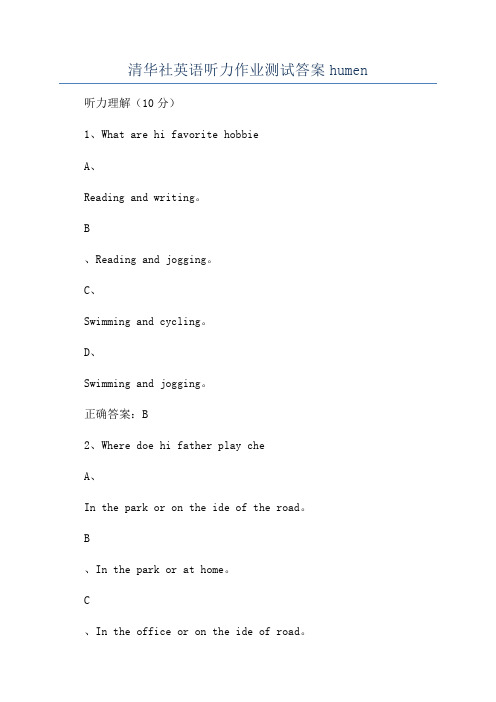
清华社英语听力作业测试答案humen 听力理解(10分)1、What are hi favorite hobbieA、Reading and writing。
B、Reading and jogging。
C、Swimming and cycling。
D、Swimming and jogging。
正确答案:B2、Where doe hi father play cheA、In the park or on the ide of the road。
B、In the park or at home。
C、In the office or on the ide of road。
At home or in the office。
正确答案:A3、In which country did the puzzle game Go originateA、Britain。
B、America。
C、Greece。
D、China。
正确答案:D4、Who will go to the upermarket to buy ome ingredient and eaoning to cook on the weekend or holidayA、Hi parent。
B、Hi mother。
Hi parent and Tom。
D、Hi father and Tom。
正确答案:C5、Why i hi family very fond of family travellingA、It i eciting to meet and make friend with people of different color and race。
B、It i one of the bet way to know the cutom and living habit of the local people。
C、When they return from their trip, they generally feel freh and energetic, ready to work harder。
七年级上册英语课堂作业听力2023

七年级上册英语课堂作业听力2023七年级上册英语课堂作业听力2023是指2023年出版的七年级上册英语课堂作业中的听力练习部分。
这些听力练习旨在帮助学生提高英语听力技能,增强对英语语言的理解和掌握。
以下是一个示例七年级上册英语课堂作业听力题目,并附带了相应的听力材料:题目:听对话,选择正确的答案。
听力材料:Woman: Excuse me, do you have any books about history?Man: Yes, we have a few. Do you want to take a look?Woman: Thank you. I'm interested in ancient history.Man: Here is a book about ancient Egypt. It's very interesting.Woman: That sounds good. How much is it?Man: It's $15.Woman: I'll take it. Thank you.Man: You're welcome. Do you need anything else?Woman: No, that's all for now. Thank you.答案:1.Yes, the man has some books about history.2.The woman is interested in modern history.3.The man suggests a book about ancient Egypt.4.The book about ancient Egypt is $10.5.The woman decides to buy the book about ancient Egypt.总结:七年级上册英语课堂作业听力2023是一个听力练习册,旨在帮助学生提高英语听力技能。
七年级上册英语课堂作业听力

英语课堂作业听力七年级上册英语课堂作业听力一、听懂并识别基本问候语1.Hello!2.Hi!3.Good morning.4.How are you?5.Fine, thank you.6.Good afternoon.7.Good evening.8.Good night.二、识别数字和时间1.One2.Two3.Three4.Four5.Five6.Six7.Seven8.Eight9.Nine10.Ten11.Eleven12.Twelve13.Thirteen14.Fourteen15.Fifteen16.Sixteen17.Seventeen18.Eighteen19.Nineteen20.Twenty21.Twenty-one22.Twenty-two23.Thirty24.Forty25.Fifty26.Sixty27.Seventy28.Eighty29.Ninety30.One hundred31.yesterday 昨日,前一天32.today 今天,今日,现在,当前,目前,本天以后我都叫tomorrow 明天,下一天,后一天,次日。
tonight 在今晚,今晚之内。
用于正规场合或引文时用this evening。
不久以后、日后the day after tomorrow 后天,日后。
用于正规场合或引文时用the day following。
那天以后。
从今往后开始计算the day before yesterday 前天,大前天。
用于正规场合或引文时用the day gone by。
已经过去的某一天。
在句中只用作时间状语 the days gone by 在过去的那段时间,以前,很久以前。
不用冠词,在句中只用作时间状语。
还可以说the day previously 或the former days作时间状语。
第一类:be 的现在式,没有具体时间状语时。
I am , You are , He is , We/You/They are + 时间副词。
义务教育课程标准英语作业本听力
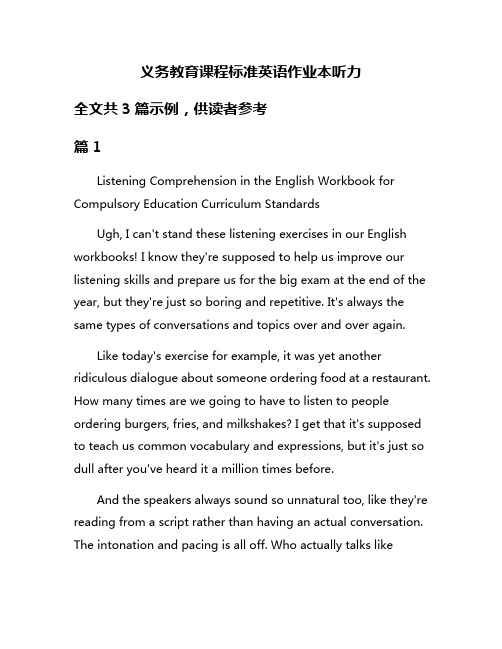
义务教育课程标准英语作业本听力全文共3篇示例,供读者参考篇1Listening Comprehension in the English Workbook for Compulsory Education Curriculum StandardsUgh, I can't stand these listening exercises in our English workbooks! I know they're supposed to help us improve our listening skills and prepare us for the big exam at the end of the year, but they're just so boring and repetitive. It's always the same types of conversations and topics over and over again.Like today's exercise for example, it was yet another ridiculous dialogue about someone ordering food at a restaurant. How many times are we going to have to listen to people ordering burgers, fries, and milkshakes? I get that it's supposed to teach us common vocabulary and expressions, but it's just so dull after you've heard it a million times before.And the speakers always sound so unnatural too, like they're reading from a script rather than having an actual conversation. The intonation and pacing is all off. Who actually talks like"Would. You. Like. Fries. With. That?" No normal human speech pattern sounds so robotic and stilted.At least the multiple choice questions that follow are usually pretty straightforward. As long as you paid even a tiny bit of attention, you can generally figure out things like what the person ordered, how much it cost, whether they wanted to eat there or take it to go, etc. It's basic comprehension stuff that doesn't really push our listening abilities.The worst ones though are when they try to incorporate some cultural aspect about America or another English-speaking country. I inevitably space out during those parts because I just cannot muster up enough interest to care about the history of Thanksgiving dinner or whatever random traditions they're rambling on about.And don't even get me started on the sections where they use different accents like British English or Australian English. I can never understand a single word they're saying! Those accent segments might as well be in a completely foreign language for how utterly confused I get trying to decipher them. My ears just cannot process those dialect variations at all.To be honest, I usually just zone out completely during the entire listening portion and then maniacally fill in the bubblesheets at the end based on some context clues and educated guesses. As long as I get like half of them right, it's still a passing grade. I figure my listening skills will develop through actual immersion and conversations anyway, not from these contrived textbook examples.I know listening comprehension is an important part of learning any new language, but I really wish our curriculum designers would liven things up a bit. Maybe throw in some fun movie clips, excerpts from popular songs, YouTuber dialogue, you know... stuff that actually relates to our lives and interests as modern teenagers. That would make practicing our listening infinitely more engaging.Heck, I'd even prefer if they had us listen to a few minutes of the morning announcements from our own school. At least then it would be accents and situations we're already familiar with. Having to strain to understand these sterile textbook recordings is just not an effective way for me to get better at real-world English listening.I guess the education experts know what they're doing by sticking to these standard dialogues and simplistic prompts. But from a student's perspective, it's just so excruciatingly dull and removed from anything we actually use English for day-to-day.I'll begrudgingly keep slogging through them to pass the class, but I can't see these skills transferring over very well to my ability to comprehend native speakers.Anyway, I've vented enough about the shortcomings of our listening curriculum. I should probably stop procrastinating and actually buckle down to study the next horrible dialogue about ordering takeout or buying groceries or whatever other insipid real-life scenario they've cooked up to torture our poor ears with. The struggle to improve my English listening is real!篇2Compulsory Education Curriculum Standard English Textbook Listening ExercisesAs an English learner in the compulsory education system, the listening exercises in our standard textbooks have been an integral part of my journey to improving my English proficiency. These exercises, while often overlooked or underappreciated, have played a crucial role in developing my listening comprehension skills and exposing me to a wide range of accents, vocabularies, and real-life scenarios.From the very beginning of our English education, the listening exercises were seamlessly integrated into our textbooks.They started with simple dialogues and monologues, featuring familiar topics such as greetings, introductions, and descriptions of everyday objects and activities. These exercises were designed to ease us into the world of English listening, allowing us to familiarize ourselves with the rhythm, intonation, and basic vocabulary of the language.As we progressed through the grades, the listening exercises gradually increased in complexity, mirroring our growing linguistic abilities. We encountered more elaborate dialogues, narratives, and even short lectures on various subjects. These exercises exposed us to a diverse range of accents, from the standard British and American accents to regional variations and non-native speaker accents. This exposure was invaluable, as it prepared us for the real-world communication scenarios we would eventually encounter.One aspect of the listening exercises that I particularly appreciated was the inclusion of cultural references and context. These exercises not only tested our listening comprehension but also provided insights into the customs, traditions, and ways of life of English-speaking communities around the world. Through these exercises, we learned about holidays, festivals, and socialnorms, broadening our understanding of the language beyond just vocabulary and grammar.The listening exercises also played a crucial role in developing our note-taking skills. As we listened to longer passages, we were encouraged to jot down key points, main ideas, and important details. This practice not only improved our ability to identify and extract relevant information but also prepared us for the academic listening tasks we would encounter in higher education and professional settings.However, the listening exercises were not without their challenges. At times, the audio quality or the speed of the speakers posed difficulties, forcing us to sharpen our focus and develop strategies for overcoming these obstacles. We learned to listen actively, to pause and replay sections when needed, and to use contextual clues to fill in any gaps in our understanding.Despite these challenges, the listening exercises in our standard English textbooks fostered a sense of confidence and competence within us. As we progressed through the exercises, we could tangibly feel our comprehension improving, and our ability to understand spoken English in various contexts grew stronger. This confidence translated into increased participation in classroom discussions and a willingness to engage inconversations with English speakers outside the classroom setting.Looking back, the listening exercises in our compulsory education curriculum were more than just a series of tasks to complete. They were a gateway to a world of diverse accents, cultures, and perspectives. They trained our ears to pick up on nuances and subtleties, and they equipped us with the skills necessary to navigate the ever-increasing presence of English in our globalized world.As I prepare to embark on the next phase of my educational or professional journey, I carry with me the invaluable lessons learned from these listening exercises. They have instilled in me a deep appreciation for the complexities of language and a curiosity to continue exploring the richness of the English language through authentic listening experiences. The compulsory education curriculum may have provided the foundation, but the journey of lifelong learning in English listening has only just begun.篇3Compulsory Education Curriculum Standard English Homework ListeningWell, here we go again with another one of those tedious listening homework assignments for English class. I swear, Ms. Johnson must get some sort of sick pleasure out of torturing us with these every week. Doesn't she realize how mind-numbingly boring they are? I mean, I get that listening comprehension is important and all for learning English, but these canned listening exercises are just the worst.The format is always the same. We have to listen to some inane dialogue or passage about completely uninteresting topics like the weather, shopping, or describing someone's daily routine. Yeah, because those are totally realistic situations a bunch of American teenagers are going to encounter and care about. Not!Then we have to answer those ridiculous comprehension questions that test our ability to pick up on random details that nobody actually pays attention to when having a real conversation. Like, "What color was the woman's shirt in the conversation?" Or, "How many times did the speaker say the word 'and'?" Who really listens for that kind of trivial nonsense?And don't even get me started on the accents and speech patterns they use in these audio clips. The speakers always sound like oveformciated robots or stuck-up Brits from the 1940s.Nobody talks like that in real life anymore, at least not in the U.S. Can't they find some more natural, contemporary audio samples to use instead?The whole exercise just feels so detached from any actual practical language learning. When am I ever going to need to obsessively analyze the most mundane and dry aspects of people's speech? These homework assignments would be way more effective if they used engaging conversations on topics my friends and I could relate to.Imagine how much more motivating it would be to listen to some authentic dialogue between American teenagers talking about video games, music, movies, social media, or the other stuff we actually care about. Or what about listening to excerpts from TV shows, YouTube videos, or podcasts we enjoy? That would make practicing our listening skills way more interesting and useful.Instead, we're stuck straining to catch boring details from these lame pre-scripted conversations about the Johnsons going grocery shopping or Mr. Thompson's morning routine before work. I start zoning out literally 10 seconds into each audio clip because the content is so dry and irrelevant to my life. No highschool student is going to perk up their ears for that. At least use some drama or humor to grab our attention!Then there's the matter of the audio quality itself on these homework CDs or website tracks we have to listen to. It's never just a straightforward, clear recording. There always has to be some distracting background noise, weird echoes, or conveniently muddled words to make it even harder to comprehend. I'm sure that's on purpose to increase the "difficulty level" and make it more "realistic." But does it really have to be that aggravating?In real conversations, you can ask the person to repeat themselves or clarify something you missed. But with these homework exercises, we have to keep rewinding and re-listening to the same 30 second clip over and over, straining to catch the one garbled word or phrase we need to answer a question. I waste so much time just trying to make out the dialogue, rather than working on actually understanding it from a comprehension standpoint. It's unnecessarily frustrating!Don't even get me started on the antiquated technology we have to use, like ancient CD-ROM discs from the 90s or those trash education company websites with terrible audio players. Why can't we just use normal podcasts, YouTube, musicstreaming sites, or really any other modern audio platform we're familiar with? Forcing us to use those relic audio formats just creates another annoying layer of technological frustration between us and the content.I have a million other English assignments to work on, but I always find myself dreading and procrastinating on these listening homework worksheets because they're so painful to get through. I usually just bear down and blast through them at the last minute, not even paying full attention because the content is so mindlessly boring. I'll skim the questions, play each clip once, jot down whatever faint details I can half-perceive, and then just guess on any questions I can't answer based on my sloppy notes. Close enough for government work, right?Ms. Johnson will never know whether I legitimately comprehended those lame conversations or not, because all that matters for getting halfway decent marks is just giving the appearance of effort. I'm sure I'm not the only student who tunes out these homework assignments while still managing to pass that section of the class. Does anyone actually get value out of spending time on these outdated, inauthentic listening exercises? Or am I just venting the shared frustrations of every Englishlanguage learner assigned busywork from antiquated textbook companies?If these homework assignments were actually engaging, relevant, utilized modern audio technology, and helped prepare us for real-world listening scenarios...maybe I'd be more enthusiastic about doing them. But as they are now, they're just a tedious chore I have to muscle through while struggling to stay awake. Snoozefest. I don't know how much longer I can keep forcing myself to do the bare minimum effort on these before I completely check out and give up. Let's just hope I don't bomb that section of the exam, or Ms. Johnson will really let me have it. What a nightmare that would be.。
(0102)《英语听力二》(高)网上作业题及答案
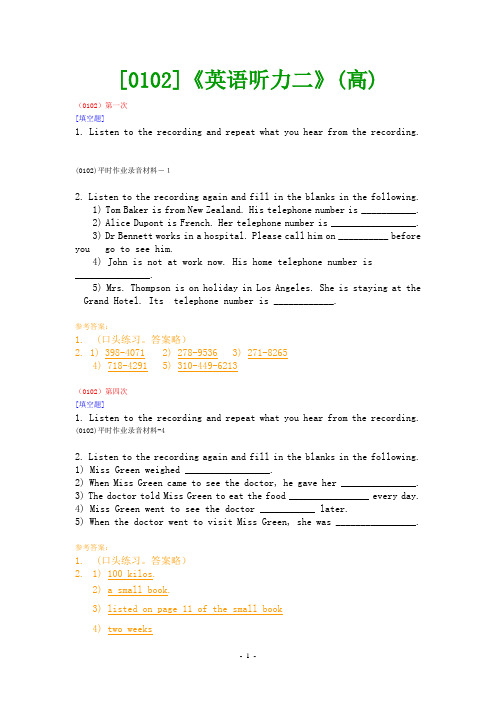
[0102]《英语听力二》(高)(0102)第一次[填空题]1. Listen to the recording and repeat what you hear from the recording. (0102)平时作业录音材料-12. Listen to the recording again and fill in the blanks in the following.1) Tom Baker is from New Zealand. His telephone number is ___________.2) Alice Dupont is French. Her telephone number is _________________.3) Dr Bennett works in a hospital. Please call him on __________ before you go to see him.4) John is not at work now. His home telephone number is_______________.5) Mrs. Thompson is on holiday in Los Angeles. She is staying at the Grand Hotel. Its telephone number is ____________.参考答案:1.(口头练习。
答案略)2. 1) 398-4071 2) 278-9536 3) 271-82654) 718-4291 5) 310-449-6213(0102)第四次[填空题]1. Listen to the recording and repeat what you hear from the recording. (0102)平时作业录音材料-42. Listen to the recording again and fill in the blanks in the following.1) Miss Green weighed _________________.2) When Miss Green came to see the doctor, he gave her _______________.3) The doctor told Miss Green to eat the food ________________ every day.4) Miss Green went to see the doctor ___________ later.5) When the doctor went to visit Miss Green, she was ________________.参考答案:1.(口头练习。
五年英语下册听力暑假作业
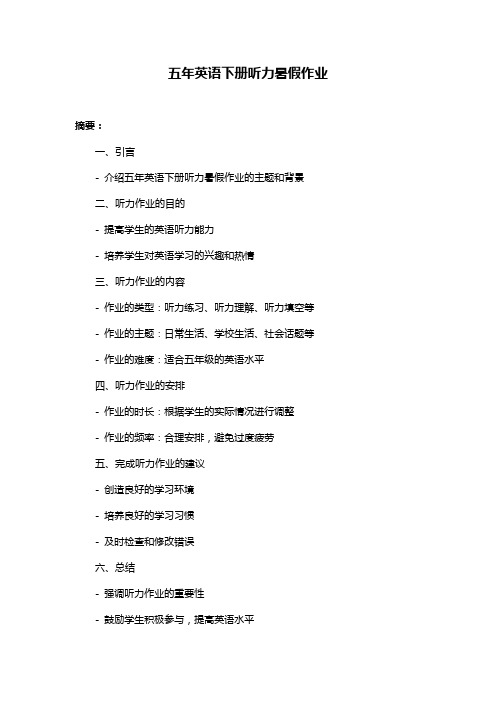
五年英语下册听力暑假作业摘要:一、引言- 介绍五年英语下册听力暑假作业的主题和背景二、听力作业的目的- 提高学生的英语听力能力- 培养学生对英语学习的兴趣和热情三、听力作业的内容- 作业的类型:听力练习、听力理解、听力填空等- 作业的主题:日常生活、学校生活、社会话题等- 作业的难度:适合五年级的英语水平四、听力作业的安排- 作业的时长:根据学生的实际情况进行调整- 作业的频率:合理安排,避免过度疲劳五、完成听力作业的建议- 创造良好的学习环境- 培养良好的学习习惯- 及时检查和修改错误六、总结- 强调听力作业的重要性- 鼓励学生积极参与,提高英语水平正文:五年英语下册听力暑假作业是为了让学生在暑假期间能够巩固和提高英语听力能力,同时也是为了培养学生对英语学习的兴趣和热情。
通过完成这份听力作业,学生可以更好地掌握英语基础知识,为接下来的学习打下坚实的基础。
听力作业的内容丰富多样,包括听力练习、听力理解、听力填空等。
这些作业都是根据五年级的英语水平设计的,既能满足学生的学习需求,又能激发学生的学习兴趣。
作业的主题涵盖了日常生活、学校生活、社会话题等方面,让学生在提高英语能力的同时,也能了解到更多的知识。
在安排听力作业时,教师需要考虑到学生的实际情况,如学习进度、学习能力等,合理安排作业的时长。
同时,要避免过度疲劳,保证学生在完成作业的同时,也能有足够的时间进行休息和娱乐。
要顺利完成五年英语下册听力暑假作业,学生需要创造良好的学习环境,如安静的房间、舒适的座椅等。
此外,还要培养良好的学习习惯,如按时完成作业、及时检查和修改错误等。
这样,才能确保听力作业的质量和效果。
总之,五年英语下册听力暑假作业对于学生的英语学习具有重要意义。
英语听力作业调查问卷模板
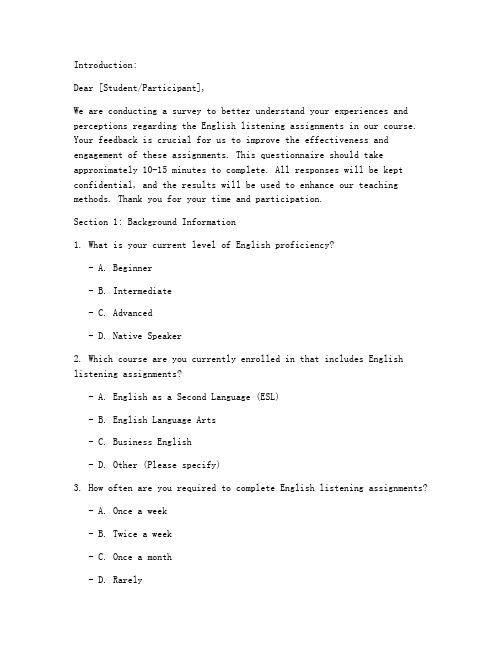
Introduction:Dear [Student/Participant],We are conducting a survey to better understand your experiences and perceptions regarding the English listening assignments in our course. Your feedback is crucial for us to improve the effectiveness and engagement of these assignments. This questionnaire should take approximately 10-15 minutes to complete. All responses will be kept confidential, and the results will be used to enhance our teaching methods. Thank you for your time and participation.Section 1: Background Information1. What is your current level of English proficiency?- A. Beginner- B. Intermediate- C. Advanced- D. Native Speaker2. Which course are you currently enrolled in that includes English listening assignments?- A. English as a Second Language (ESL)- B. English Language Arts- C. Business English- D. Other (Please specify)3. How often are you required to complete English listening assignments?- A. Once a week- B. Twice a week- C. Once a month- D. RarelySection 2: Listening Assignments4. On a scale of 1 to 5 (1 being lowest, 5 being highest), how would you rate the difficulty of the listening assignments?- 1. Very Easy- 2. Easy- 3. Moderate- 4. Hard- 5. Very Hard5. How do you typically prepare for your English listening assignments?- A. Reviewing the listening materials before class- B. Listening to the materials multiple times- C. Discussing the assignments with classmates- D. Other (Please specify)6. Do you find the listening assignments to be helpful in improving your English listening skills?- A. Extremely helpful- B. Very helpful- C. Somewhat helpful- D. Not helpful- E. Unhelpful7. What types of listening materials do you prefer for your assignments?- A. News broadcasts- B. Podcasts- C. Conversations- D. Narrated stories- E. Academic lectures- F. Other (Please specify)8. How often do you encounter difficulties while listening to the assigned materials?- A. Always- B. Often- C. Sometimes- D. Rarely- E. Never9. What are the main challenges you face when completing listening assignments?- A. Difficulty understanding the spoken English- B. Limited vocabulary knowledge- C. Slow listening speed- D. Difficulty following the plot or context- E. Other (Please specify)Section 3: Course and Teaching Methods10. How would you rate the clarity and organization of the instructions provided for the listening assignments?- 1. Poor- 2. Fair- 3. Good- 4. Very Good- 5. Excellent11. Are the listening assignments aligned with the course objectives and learning outcomes?- A. Strongly agree- B. Agree- C. Neutral- D. Disagree- E. Strongly disagree12. How effective do you find the feedback provided on your listening assignments?- A. Extremely effective- B. Very effective- C. Somewhat effective- D. Not effective- E. Ineffective13. What additional resources or support would you like to have to improve your listening skills?- A. Access to a wider variety of listening materials- B. Additional practice exercises- C.。
英语听力写作业
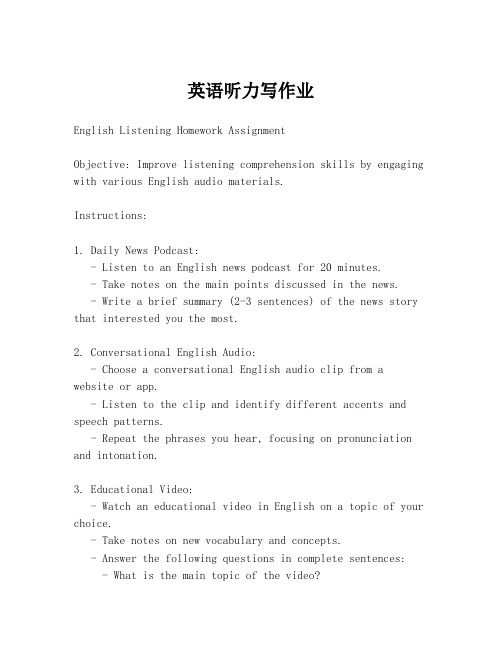
英语听力写作业English Listening Homework AssignmentObjective: Improve listening comprehension skills by engaging with various English audio materials.Instructions:1. Daily News Podcast:- Listen to an English news podcast for 20 minutes.- Take notes on the main points discussed in the news.- Write a brief summary (2-3 sentences) of the news story that interested you the most.2. Conversational English Audio:- Choose a conversational English audio clip from a website or app.- Listen to the clip and identify different accents and speech patterns.- Repeat the phrases you hear, focusing on pronunciation and intonation.3. Educational Video:- Watch an educational video in English on a topic of your choice.- Take notes on new vocabulary and concepts.- Answer the following questions in complete sentences:- What is the main topic of the video?- What new information did you learn?- How did the speaker present the information?4. Movie or TV Show Scene:- Watch a scene from an English-language movie or TV show. - Pay close attention to the dialogue and try to understand the context.- Write down any idiomatic expressions or slang words you encounter and look up their meanings.5. Discussion Forum:- Join an online English discussion forum and participate in a thread.- Listen to any audio posts or responses from other members.- Respond to at least two different posts with your own thoughts, using proper grammar and vocabulary.6. Listening Comprehension Exercise:- Complete a listening comprehension exercise from an online resource or textbook.- Answer the questions provided, and if possible, discuss your answers with a partner.7. Reflection:- At the end of the session, reflect on your listening experience.- Write down what you found challenging and what you found easy.- Set goals for your next listening practice session.Submission:- Please submit your written summaries, notes, answers to questions, and reflections via email or on the class portal by the end of the week.Note: Remember to practice active listening by focusing on the speaker, taking notes, and trying to understand the context and nuances of the conversation. Happy listening!。
高中英语 听力原文课下作业 北师大版选修8

附录:听力原文阶段仿真检测(一)(Text 1)M: How did your parents like the play they saw last week?W: My mother thought the language was terrible, but my father liked it.(Text 2)M: Does Rose Hunter live here? I have a letter for her, but her name is not on the mailbox.W: Yes. She lives beneath us on the second floor.(Text 3)W: I heard that Janet has left her job.M: Why? I thought she was making good money.W: She couldn't stand it. She was working up to 60 hours a week.(Text 4)M: Wake up. We're getting ready to land.W: I'm still tired. Did you have a sleep?M: No. I'm too excited. You'll feel better when we're walking around in London.W: I hope so.(Text 5)M: Sally, do you remember you promised to go out with me some weekend?W: Of course I remember my promise, Jack.M: Will this weekend do?W: I'm afraid not. Sandy already invited me out. Sorry.(Text 6)M: Hello, Mary. I can't wait to tell you —I am going home this Sunday, September 30th. I'll take Flight TA 337 from Dubai and will arrive in Beijing at about 6 pm.W: Really? That's so great.M: Well, it's been quite a long time from last June to this September. I miss you and our daughter every day.W: We miss you too, John. I'll take Lily to the airport and wait for you at the exit.(Text 7)W: Hi, Johnny. Do you want to go to the cinema on Tuesday?M: Sorry, I can't. I'm going swimming with Anna.W: Then what are you doing on Thursday?M: I haven't decided yet. Shall we eat at the French restaurant?W: I went there last week. It was very expensive. The Chinese one down the road is much cheaper.M: What's it called?W: Beijing Roast Duck Restaurant.M: Oh, yes, I know the one. Let's try it.(Text 8)W: Hello, Mike. Are you doing a parttime job?M: Yes. I'm working two nights a week at a café.W: Do they pay you well?M: Not bad.W: Well, I just got a parttime job at the post office.M: Did you? That's good. So you'll be earning some extra money, too.W: Yeah. May I ask a personal question?M: It depends. What do you want to know?W: What do you do with the money you earn? Do you spend it immediately or do you just save it?M: Well, I spend some of it on books and entertainment. I also save some for trips.W: I see. Thank you.M: Hope you enjoy your parttime job.(Text 9)W: Mr Miller, you are late for work!M: I'm very sorry.W: Why did you get here so late?M: It's a long story.W: I'd like to hear it.M: Last night there was an exciting football match on TV, France against Germany. You know, I am a football fan. It ended at 3:00 am. So I got up late this morning.W: Did you catch the train?M: No, I called for a taxi. There were a lot of cars and buses on the highway. Unfortunately an accident happened and caused a traffic jam. I was very worried.W: What happened after that?M: The police came, but everyone had to wait for a long time. When I finally got to the office, it was already 10 o'clock.W: I hope you won't be late again. Otherwise I will fire you.M: I'll never be late again.(Text 10)W: Charles, I want to ask if you know anything about hotels on the Costa Rica.M: Why? No, I'm afraid I can't be very much help to you there.W: Well, it's just that we've been thinking of taking the family to Spain this summer and at this rather late stage we're trying to organize ourselves a suitable hotel. But I thought that you'd been to the Costa Rica.M: It's certainly a bit late. But have you looked at the advertisements?W: Well, yes. As a matter of fact I read one this morning in the Sunday Paper which sounded wonderful.M: For a hotel?W: Yes. Just outside Barcelona. It's said that this hotel is right on the beach, and that's essential as far as we're concerned.M: I know just what you mean.W: And all the rooms have balconies facing the sea and overlooking the beach. The food is good too.M: Then why bother asking if it's so good?W: Well, you can never tell, can you?M: Of course. The only way to find out for certain is to go and try it.W: Yes, I agree with you.阶段仿真检测(二)(Text 1)M: Excuse me, what's the price of this computer?W: We give a discount of 20% until this Sunday, so you can take it for $4,000. Next week there will be only a 10% discount.(Text 2)M: How about going to the cinema tonight?W: Why not? It's much better than watching a boring TV show or playing cards.(Text 3)M: The computer game is wonderful. It makes me relaxed.W: But you can just go to sleep for a rest instead. It is a total waste of time.M: But the game is entertaining at the same time.(Text 4)M: Hey, Jane. You look tired. What's wrong?W: I've been busy practicing driving all day. I will have a driving test tomorrow.M: You didn't attend any driving classes, did you? They are very helpful.W: I'll attend one if I fail to pass the test.(Text 5)W: I want to buy a new mobile phone this weekend. Would you like to go with me?M: I am free this weekend. But actually I don't know much about the brands of the phones and their features.W: It doesn't matter. I just don't want to go shopping alone. I'll treat you to dinner.M: That's great.(Text 6)M: Kate, what's your plan for the summer holiday?W: I have no idea. Maybe I will stay at home as usual. What about you?M: My parents want to take me to see my grandparents in a faraway village. But I feel like traveling to some places of interest.W: I think it's better for you to see your grandparents first. Then you can go traveling.M: That will be fine.W: Shall I travel with you after you come back from the village?M: Why not? I plan to travel with some of our friends.(Text 7)M: Hi, Li Li, where are you going?W: I'm going to see a doctor. I am always tired these days.M: You should do some physical exercise.W: Oh, I think it's boring.M: But doing sports is good for your health.W: I see you play football with our classmates every day. Is that so exciting?M: Of course. Some of us just like running around, and some enjoy the feeling of winning a game. But for me, teamwork is the most attractive part.W: Maybe I can also try some ball game. How about basketball?M: That's too hard. You should start with jogging.(Text 8)M: Hello, is that Peter speaking?W: No. This is Jane, Peter's sister. Peter is at the neighbor's. Who's that speaking?M: This is Tom, Peter's classmate. I want to tell Peter we'll have no class this afternoon. There's no need for him to come to school. Would you please give him the message?W: That's OK.M: By the way, on Saturday some of our classmates will visit the nursing home near our school. Please ask Peter whether he will go with us or not.W: How can he inform you if he wants to go?M: Let him ring me back.W: Tomorrow, go to the nursing home. Anything else?M: On Sunday afternoon, we'll go swimming. Please remind him to take a swimming suit with him if he would like to come with us.W: Yes. Go swimming, the day after tomorrow. I'll tell him.M: Thanks a lot.(Text 9)M: Hello. My name is Jim. I am very glad to see you.W: Hi. My name is Lily. Nice to see you, too.M: What do you think of our university?W: Oh, it's very big. It is fully equipped with modern facilities and the campus is beautiful.M: Yes, that's true. Can you tell me which department you are in?W: I intended to learn history or English, but I was admitted to the Chinese department.M: Oh, we are in the same department.W: Let's go there together.M: OK. Have you heard that there will be many activities for us freshmen in the first week of the term?W: Yes. There will be a dance party on Wednesday night, a lecture on Thursday afternoon and a singing competition on Friday night. I wish Friday could come sooner, because I really like listening to people with beautiful voices singing.M: To tell the truth, I will take part in the singing competition.W: Oh, really? I really admire people who can sing well! I'll support you.M: Thank you.(Text 10)There are many foreigners living in Singapore.Victoria Great came to Singapore from England for work in 2003. Here she met her husband and gave birth to her daughter. Her two sisters also live here now. She says, “People in Singapore are generally very comfortable with diversity and are very welcoming. The taxi drivers, in particular, are very friendly. I've had some interesting conversations with them, as they often start a conversation.”Italian Nicole Beath has been in Singapore for more than 10 years. She and her husband have just bought a house. They plan to stay at least another five years. She says, “Singapore is a safer city than most. I love it. People often comment that there are so many strict laws in Singapore, but we see the benefits. Here, we are comfortable with our children using public transport in the evenings and staying out with friends in a shopping center even after dark.”Danya Goll and her husband left Australia nine years ago. All three of their children were born here. They don't plan to leave Singapore within seven years, if they will leave at all. She says, “I think the standard of education for children is topclass. My friends in Sydney only have the choice of day care for kids under three. But my fouryearold can now do basic reading and writing in both English and Chinese.”阶段仿真检测(三)(Text 1)M: Excuse me, I want Who Moved My Cheese?W: Let me see. Sorry, it will not be back for another 2 weeks.(Text 2)M: The speaker himself seems sleepy.W: Maybe he doesn't like the meeting, either.(Text 3)M: Which flavor would you like, orange, lemon, strawberry or milk?W: The last, please.(Text 4)M: It's much too cold here! I'm almost frozen!W: Well, maybe it is, but it's too hot in your hometown.(Text 5)M: I decided to travel across the country by bike!W: God! You can't be serious!(Text 6)M: Hey, Mary. You look so tired today. What's wrong with you?W: Oh, I didn't have a good sleep last night.M: What happened?W: There are three other people in our dormitory. And we went to a big party last night. We were very excited.M: So you couldn't go to sleep?W: No. I was worn out. But Sally, one of my roommates, was too excited to fall asleep. So she decided to do some washing.M: Ha ha, she is a hardworking girl.W: Yes, but I didn't like it!M: Didn't the other two girls say anything?W: The other two girls? They didn't come back until 3:00 this morning!M: How did you know that?W: I was not asleep when they came back!(Text 7)M: Excuse me, what kind of movie will be on show today?W: Well, let me see. Oh, there is a new movie here, Baby Plan, acted by Jackie Chan, an action movie.M: Really? I like Jackie Chan's films. When will it start?W: 7:00, 9:30, 11:20, 14:50 and 18:00.M: Ah, it's 7:10 now, and I must wait for Lily. She said she would be here in an hour. OK, I want two tickets for the second show.W: OK. The tickets for the A area are 15 yuan each, and the ones for the B area are 12 yuan each.M: A area, please.W: OK. Here you are.M: Thank you.(Text 8)M: Oh, it's 7:15. I have to go now.W: Isn't it early?M: No, look at the clock on the wall.W: Don't you forget it's thirty minutes fast? It's only 6:45 now.M: Ah, I have enough time to have breakfast.W: Will you come back earlier today?M: Is there anything important?W: Yes. There will be a party at 7:00 pm at school. And Jim hopes we can come.M: Well, I've no idea, because I have a very important meeting this afternoon. But I will try to come back early.W: Jim will be very happy if he hears that. You know, you always say you are busy. You haven't had a good time with our children for a long time.M: I'm really very sorry, but I'm really very ...W: Busy! Yes?(Text 9)M: Hi, Sally. How is it going?W: Fine. What about you?M: Great. Thank you. Do you have any plans for your May Day holiday?W: Oh, I've decided to go traveling with my parents.M: That sounds good. Where do you want to go?W: Beijing. I'd like to see the Great Wall. In fact, we planed to go to Yunnan. But we don't have enough time. That's really a pity. How about you? Do you have any plans?M: I would rather stay at home for the whole holiday. I am so tired these days and I need a good rest. You know the exam is coming soon. When we finish our holiday, we must prepare for it.W: Yes. That sounds pretty good to stay at home, but a little boring.M: Maybe I will go to the movies with my friends.W: I heard there are some good films on these days.M: I want to see comedies, because I will think about nothing except laughing.W: Oh, here comes the teacher. Let's have the math class now.(Text 10)Good evening, everyone. I'm Lucy Green, welcome to my program. First, I will give you a piece of news.Guangzhou, the capital city of Guangdong Province, announced that the people there were not allowed to ride electric bicycles, and those who broke the rule would befined, or their bikes might even be taken away, by the police on Monday. After the government announced the rule, Guangdong Bicycle Industry Association sent a letter to the government on Tuesday. The letter was signed by 110 companies, as well as nine thousand staff members and bicycle riders. The letter said that since the electric bicycle was a kind of bicycle, it should be treated like a normal bicycle, and should be allowed to run freely on the road. Also, they noted that the Law on Road Traffic Safety doesn't give the local government the right to forbid riding electric bicycles. Some of them believed that the related departments should accept the people's advice about the rule, and find a good way to solve this problem. Now they are waiting for the government's reply.阶段仿真检测(四)(Text 1)M: Tom got the highest grade in the biology test.W: No wonder! He's at the library every day.(Text 2)M: What kind of pet would you like to have?W: Well, I love fish. Every time I see fish swimming, I feel calm, no matter where I am.(Text 3)W: Would you tell me when the two performances start?M: The first begins at 7 pm, and lasts 2 hours; the second is right after a 10minute break.(Text 4)M: Here we are!W: You guys finally made it. We are about to give up on you for the trip to the museum.M: Sorry. We got lost just now.W: Never mind. Let's go now. We have a busy day today.(Text 5)W: You have to go to the airport now. Come on, the taxi is waiting.M: Did you say taxi? I thought we were going in your car.W: Yes, I had planned to, but I'll explain later. You've got to be there in an hour.M: The plane doesn't leave for two hours. Anyway, I am ready to go now.(Text 6)M: Hey, Mary. What did you do last weekend?W: Nothing special. And you?M: I spent most of the time getting ready for this class. There was so much reading to do.W: I know what you mean. I was up till 4 am finishing the essay. I only got about four hours' sleep last night.M: Well, we've still got about twenty minutes before Professor Berry gets here. You want to get a coffee or something?W: Yeah, coffee sounds good.(Text 7)W: Excuse me, sir. I'm trying to find my way to the Art Gallery. Can you tell me how to get there?M: Are you driving or taking public transport such as the subway?W: I'm taking the bus.M: That's good. It's slower, but you'll get to see more of the city on the bus. First, you have to walk east to Washington Street where you'll catch the No. 4 bus. Take it for five stops. Get off the bus at Fifth Avenue and transfer to the No. 9 bus. Then ask the driver to let you off at Stone Road. You'll see the Art Gallery on the corner. You can't miss it.W: Thanks. I really appreciate your help.M: My pleasure.(Text 8)W: Today is Friday. We'd better make a decision on who is fit for the position, Robert.M: OK. Let me think it over. First, this person must speak good English.W: And we need a girl.M: That's true. To host such an English speech contest can be a challenging job, so she must be smart enough as well as dependable.W: How about Mary then?M: Oh, Mary is dependable but she is a little slow. Is Rose suitable?W: Well, Rose is smart but she is a bit shy. How about Jane? She seems to have all of the qualities we need.M: All right. Please tell her as early as possible, so that she can prepare herself for our contest.(Text 9)M: Hello. Can I help you?W: Fill her up, please.M: Where are you going?W: Peter Waters' farm, near Chesterton.M: I know it well.W: How long will it take me to get there?M: About fifteen minutes, but there is a shortcut.W: Could you tell me how to use the shortcut?M: Sure. You take the next left turn. You'll see a stop sign. Make a right at the sign. Stay on that road, and you'll cross a blue bridge. Then you'll see a big old red house. That's the back of Peter Waters' place.W: OK. Let me repeat it. I take the left turn to the stop sign. Then a right, across a blue bridge, and then a big red house.M: Can't miss it.(Text 10)Good afternoon, everyone. My name is Richard Parry and I'm the school director.I do hope you have all had a good journey, although I'm sure you must be feeling rather tired. No doubt you are looking forward to meeting the families you're going to be staying with during the next month. Now, please listen carefully to the following arrangements as the various families are waiting in four groups to meet you.If your family name begins with the letter A to F, your host family will be waiting for you in this hall. At the end of the meeting, you should wait behind in here. Now, for those whose names begin with G to L — you should go downstairs to the dining room. Make sure you go to the far end of the room by the drinks machine. That's important as people whose names begin with a letter from M to R should also go downstairs and wait at the opposite end of the dining room near the doors into the garden. And the final group —those with names from S to Z, must go out of this hall, past the office to the car park and your families will be waiting there.- 11 -。
四年级上英语作业本听力材料

四年级上英语作业本听力材料全文共3篇示例,供读者参考篇1Four Grade English Listening MaterialsUnit 11. Listen and circle the word you hear.1. A. cat B. car C. cow2. A. dog B. duck C. door3. A. cake B. candy C. cat4. A. fish B. dish C. dash5. A. sun B. sand C. wind2. Listen and match the picture with the correct sentence.1. The dog is running in the park.2. The cat is sleeping on the bed.3. The bird is flying in the sky.4. The fish is swimming in the water.5. The rabbit is eating carrots in the garden. Unit 21. Listen and fill in the blanks.1. I have a _______, a _______, and a _______.2. My sister has a _______ and a _______.3. Our mother has a _______ and a _______.4. Our father has a _______ and a _______. 2. Listen and choose the correct answer.1. What color are the apples?A. RedB. BlueC. Yellow2. What fruit is sweet and sour?A. GrapesB. LemonsC. Bananas3. What vegetable is green and long?A. EggplantB. CucumberC. Carrot4. What drink is cold and fizzy?A. MilkB. JuiceC. SodaUnit 31. Listen and circle the correct answer.1. A. What’s your name?B. Where are you from?2. A. How old are you?B. What grade are you in?3. A. What do you like to do?B. What’s your favorite color?2. Listen and match the sentences with the correct picture.1. I like to play basketball.2. My favorite color is blue.3. I am from China.Unit 41. Listen and answer the questions.1. What is the girl doing?2. What is the boy playing with?3. Where is the lady sitting?4. What is the man holding?2. Listen and fill in the blanks.1. ---- is my favorite sport.2. I like to eat ____ for breakfast.3. My _____ is very beautiful.4. I have a big ______ and a small ______.These listening materials are designed to help improve students' listening comprehension skills in English. By practicing listening to various sentences, questions, and answers, students can enhance their ability to understand spoken English and improve their overall language skills.篇2Four Years English Workbook Listening MaterialsUnit 1Part 1Listen to the conversation and choose the correct answer.1. Where is Peter from?A. ChinaB. JapanC. America2. What color is Peter's backpack?A. BlueB. GreenC. RedPart 2Listen to the sentences and match the picture.1. The cat is on the chair.2. The bear is beside the tree.Part 3Listen to the story and answer the questions.1. What did Amy do yesterday?2. Where did Amy go last summer?Unit 2Part 1Listen to the conversation and fill in the blanks.Peter: What is your favorite __________?Amy: I like __________ and __________.Part 2Listen to the sentences and choose the correct picture. Part 3Listen to the story and answer the questions.1. What did Peter and Amy do on Sunday?2. What did Peter eat for breakfast?Unit 3Part 1Listen to the conversation and choose the correct answer.1. What is Tom doing?A. ReadingB. WritingC. Drawing2. What sports does Tom like?A. Soccer and basketballB. Swimming and volleyballC. Tennis and footballPart 2Listen to the sentences and match the picture.Part 3Listen to the story and answer the questions.1. What time does Tom usually go to bed?2. What is Tom's favorite subject at school?Unit 4Part 1Listen to the conversation and fill in the blanks.Amy: What do you usually do on __________?Peter: I usually __________ with my friends.Part 2Listen to the sentences and choose the correct picture.Part 3Listen to the story and answer the questions.1. What did Peter do last weekend?2. Who did Peter play basketball with?These listening materials are designed to help students improve their listening skills in English. Each unit includes a variety of listening activities, such as conversations, sentences, and stories, to engage students and test their comprehension. By practicing listening to different accents, intonations, and speech patterns, students can enhance their ability to understand spoken English. These materials can be used in the classroom or as homework assignments to reinforce learning.篇3Title: Listening Materials for Fourth Grade English WorkbookIntroduction:The fourth grade English workbook is designed to help students improve their English listening, speaking, reading, and writing skills. The listening materials included in the workbook are an essential component of language learning, as they expose students to a variety of accents, intonations, and speech patterns.This document provides a detailed overview of the listening materials included in the fourth grade English workbook.Listening Materials:1. Conversations: The workbook includes a series of conversations between native speakers discussing everyday topics such as school, family, hobbies, and weather. Students are required to listen to the conversations and answer questions based on the information provided in the dialogue.2. Short Stories: The workbook features a selection of short stories that are read aloud by narrators. These stories cover a range of themes including friendship, teamwork, courage, and honesty. After listening to the stories, students are asked to summarize the main events and identify the key messages.3. Listening Comprehension Exercises: The workbook contains a variety of listening comprehension exercises where students listen to a passage and answer questions to test their understanding of the content. These exercises are designed to improve students' listening skills and help them develop strategies for comprehending spoken English.4. Songs: The workbook includes a number of songs with catchy tunes that are sung by professional singers. The lyrics areprovided in the workbook, allowing students to follow along as they listen to the songs. This interactive approach helps students improve their pronunciation and vocabulary while enjoying music.5. Dictation: The workbook includes dictation exercises where students listen to sentences or paragraphs and write down what they hear. This activity helps students improve their listening accuracy, spelling, and handwriting skills. It also enhances their ability to recognize and understand spoken English in real-time.Conclusion:The listening materials included in the fourth grade English workbook are designed to engage students and facilitate their language learning process. By listening to conversations, stories, songs, and dictation exercises, students can enhance their listening comprehension, pronunciation, vocabulary, and overall English proficiency. These materials provide a well-rounded approach to language learning and enable students to develop the necessary skills to communicate effectively in English.。
小学四年级上册英语单元作业听力材料

小学四年级上册英语单元作业听力材料第一单元一、听音,标序号。
1. Turn on the light.2. Sweep the floor.3. Open the door.4. Clean the window.5. Put up the picture.二、听录音,请选出你所听到的单词。
1. ant2. hat3. farmer4. bed5.beef6. E I D7. wall8. board9. idea 10. teacher’s desk三、听录音,请为所听到的句子选择恰当的答语。
1. Where is the computer? (A)2. Let’s clean the desks and chairs. (B)3. Let’s clean the classroom. (C)4. What’s in the classroom? (A)5. Have some juice. (B)四、听音排序。
听录音将下面的句子按照听到的顺序排序。
1. Good moring. Let’s clean the classroom.2. Let’s clean the desks and chairs.3. Let me clean the window.4. Let me clean the board.5. Wow! It’s nice and clean. Good job.第二单元一、认真听,写出你所听到的字母的大小写,写完之后并按照字母表顺序排列起来。
Ee I i F f G g H h Ee Ff Gg H h Ii二、听音,标序号。
1. Put your pencil-case on your chair.2. Put your pencil in your desk.3. Put your book on your head.4. Put your eraser near your pencil-case.5. Put your notebook under your bag.三、认真听,选出你所听到的单词。
小学英语有效听力作业的设计与应用
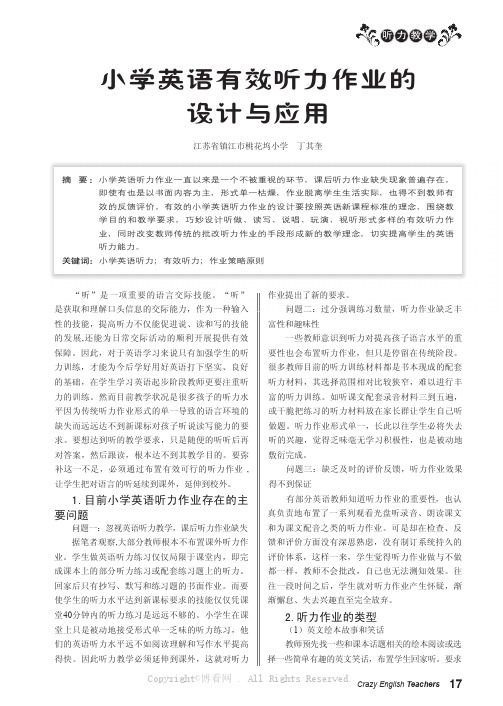
17Crazy EnglishTeachers摘 要:小学英语听力作业一直以来是一个不被重视的环节,课后听力作业缺失现象普遍存在。
即使有也是以书面内容为主,形式单一枯燥,作业脱离学生生活实际,也得不到教师有效的反馈评价。
有效的小学英语听力作业的设计要按照英语新课程标准的理念,围绕教学目的和教学要求,巧妙设计听做、读写、说唱、玩演、视听形式多样的有效听力作业,同时改变教师传统的批改听力作业的手段形成新的教学理念,切实提高学生的英语听力能力。
关键词:小学英语听力;有效听力;作业策略原则江苏省镇江市桃花坞小学 丁其奎“听”是一项重要的语言交际技能。
“听”是获取和理解口头信息的交际能力,作为一种输入性的技能,提高听力不仅能促进说、读和写的技能的发展,还能为日常交际活动的顺利开展提供有效保障。
因此,对于英语学习来说只有加强学生的听力训练,才能为今后学好用好英语打下坚实、良好的基础,在学生学习英语起步阶段教师更要注重听力的训练。
然而目前教学状况是很多孩子的听力水平因为传统听力作业形式的单一导致的语言环境的缺失而远远达不到新课标对孩子听说读写能力的要求。
要想达到听的教学要求,只是随便的听听后再对答案,然后跟读,根本达不到其教学目的。
要弥补这一不足,必须通过布置有效可行的听力作业 , 让学生把对语言的听延续到课外,延伸到校外。
1.目前小学英语听力作业存在的主要问题问题一:忽视英语听力教学,课后听力作业缺失据笔者观察,大部分教师根本不布置课外听力作业。
学生做英语听力练习仅仅局限于课堂内,即完成课本上的部分听力练习或配套练习题上的听力。
回家后只有抄写、默写和练习题的书面作业。
而要使学生的听力水平达到新课标要求的技能仅仅凭课堂40分钟内的听力练习是远远不够的。
小学生在课堂上只是被动地接受形式单一乏味的听力练习,他们的英语听力水平远不如阅读理解和写作水平提高得快。
因此听力教学必须延伸到课外,这就对听力作业提出了新的要求。
初中英语听力家庭作业
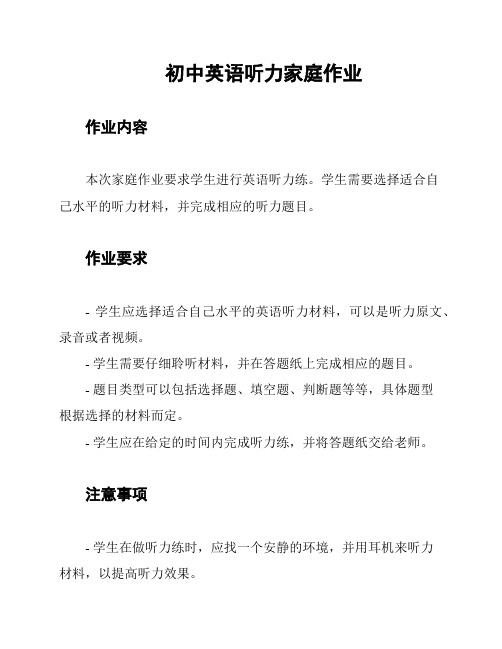
初中英语听力家庭作业
作业内容
本次家庭作业要求学生进行英语听力练。
学生需要选择适合自
己水平的听力材料,并完成相应的听力题目。
作业要求
- 学生应选择适合自己水平的英语听力材料,可以是听力原文、录音或者视频。
- 学生需要仔细聆听材料,并在答题纸上完成相应的题目。
- 题目类型可以包括选择题、填空题、判断题等等,具体题型
根据选择的材料而定。
- 学生应在给定的时间内完成听力练,并将答题纸交给老师。
注意事项
- 学生在做听力练时,应找一个安静的环境,并用耳机来听力
材料,以提高听力效果。
- 在完成答题时,学生应认真审题,确保理解题意及要求。
- 如果有不理解的内容,学生可以在课后与老师讨论,以便更好地理解并提高听力能力。
作业评分
本次听力家庭作业将根据学生的答题情况进行评分,评分标准如下:
- 回答正确并准确无误:满分
- 回答正确但有少量错误:部分分
- 回答错误或未完成:零分
提示
为了取得更好的效果,学生可以多通过听力材料来提高自己的听力技巧和理解能力。
在平时的研究中,多听、多练可以帮助学生提高英语听力水平。
同时,学生也可以向老师请教一些有效的听力技巧和方法。
希望同学们能够积极参与听力练,提高自己的英语听力能力。
西南大学《英语听力一》(高)网上作业题及答案
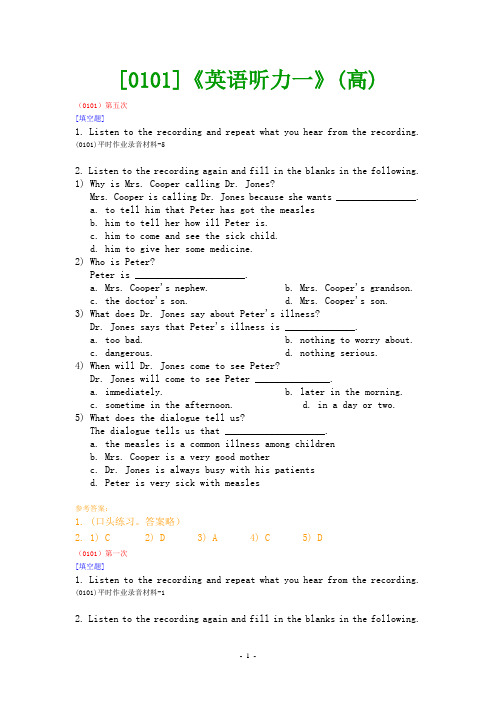
[0101]《英语听力一》(高)(0101)第五次[填空题]1. Listen to the recording and repeat what you hear from the recording. (0101)平时作业录音材料-52. Listen to the recording again and fill in the blanks in the following.1) Why is Mrs. Cooper calling Dr. Jones?Mrs. Cooper is calling Dr. Jones because she wants ________________.a. to tell him that Peter has got the measlesb. him to tell her how ill Peter is.c. him to come and see the sick child.d. him to give her some medicine.2) Who is Peter?Peter is ______________________.a. Mrs. Cooper's nephew.b. Mrs. Cooper's grandson.c. the doctor's son.d. Mrs. Cooper's son.3) What does Dr. Jones say about Peter's illness?Dr. Jones says that Peter's illness is ______________.a. too bad.b. nothing to worry about.c. dangerous.d. nothing serious.4) When will Dr. Jones come to see Peter?Dr. Jones will come to see Peter _______________.a. immediately.b. later in the morning.c. sometime in the afternoon.d. in a day or two.5) What does the dialogue tell us?The dialogue tells us that ____________________.a. the measles is a common illness among childrenb. Mrs. Cooper is a very good motherc. Dr. Jones is always busy with his patientsd. Peter is very sick with measles参考答案:1. (口头练习。
- 1、下载文档前请自行甄别文档内容的完整性,平台不提供额外的编辑、内容补充、找答案等附加服务。
- 2、"仅部分预览"的文档,不可在线预览部分如存在完整性等问题,可反馈申请退款(可完整预览的文档不适用该条件!)。
- 3、如文档侵犯您的权益,请联系客服反馈,我们会尽快为您处理(人工客服工作时间:9:00-18:30)。
Week1nullWeek2The Fourth Industrial revolution Technology-Driven, Human-Centred A:But,moore,let’s talk with you. Are you feeling out mistake? Because you opt mistake. Cause that twitter pole entente the impart of technology and the way people can holnazition the positive way.B:I think you friend, actually quite beautifully the way you can set it up. Because you know it’s incredible tension right now between this dramatic innovation and this turn ring. But it’s also there is issues of quality. And this is ,I think will go to be really idle work for the next stay kid. We all know this innovation is dramatic if this happening, and you know cause many powerful expects of what we call it through that I’m firm the fourth industrial revolution. The fourth industrial revolution is why range of arrangement innovation. And information technology, bio technology and so word so on, and each one of this they have opportunity to move the world foreword in really incredible ways. If you look each one have yest did you go. We just took some time went through and looked each one andfood and poverty and the ocean and the air earth **. Across the board, I want to hit some of them leader a session. We can dramatically improve this arrangement of technology. But, I’ll give you like a example though, so, if you have very recently just right here in this harbor there was a major new a battle ship launch. The battle ship that was launch was internal was a battle ship. And it’s not first one launch tear in. Also there is many nation staff for the launch to internal this battle ship.A:You mine the self-driving battle ship. That bit self-driving anything.B:I can give you down words that’s batter. But this idea you have * this battle ship, self-driving battle ship, there is no sailors of this battle ship, right? It is the beginning of native without sailors. We can all imagine that, because this ships driving on the ocean right now soft prepared, and there is no sailors on the battle ship, there is no can be any pilots on the plane. You know why, in San Francisco when I am from we have taxi without taxi drivers, we have tracks, you know big tracks going down the high way without track drivers, we have grocery stores in the governor state without cashiers, and we can kind of start to go on and on and on. We have military without infantry, and this is all possible through this incredible way of new technology. But when we look at that technology that iswhen we really have to start ask our self, well, ok, here is a amazing new AI technology, by the accident, maybe I’m go to be welfare,because I can treat crown things and this kind of things better. Maybe I’m go to be smarter, because I have accident education this kind of things. Maybe there is something make me go to be healthier. Because all my medical date will be intelligently bright me with smart wise through sentence.So, those is some powerful dimensions, you don’t have to play that individually, you can also look that organizationly. Companies will be batter, with AI. Countries or states will be better. But what about the one if you do not have it, do you see. So that’s when I want to say ok, you can put them all out there, but then, hold on, who have these AI? Is these go to be help by certain companies? Or certain countries?We know there was major nation state leader who said last week, the country control the AI will control the world.A:That was Russian leader, is n’t it.B:So,I think the question is out there, all right. Which is you know I talk about this this morning, which is should we think about these AI will basic human right. If you over the United station they have war to basic human right since they believe in, is these do to be so fun to man society that every country should have, every person and every company should have some kind of marked at the axis AIis basic human to right. And that is AI is not an iced digit, today, but should be a part of the iced digits, should be a you aren’t special on broadway for AI, is this big enough for all of the nextstakid. That we only to be so focus devote to provide this kind of marked decisions of them. So that was on kind of beginning every other part that they want to take anymore chance.A:That is fantastic to this questions, and very provocative, and I think that…B:Oh, you going to answer the measure for me.Week3A:And today special guest on.The words you’ll hear is recruitment officer from one of our country’s leading financial institutions.A lot young people around there looking for a job.How many people does your bank group recruit annually?B:Normally the national westminster bank group is looking for about two hundred graduate management trainees each year. A people they expect to become managers and senior managers in the medium term.A:In the medium term.How long is that?B:Well, it takes at least ten years to get to be a proper manager, and you're talking about the career which will last until retirementduring many cases. But they're not west as we call the national westminster bank doesn't just recruit this group of two hundred, it also recruits a round about twenty or what are called super grads.A:Pardon, super what?B:A super grads means super graduates.people who we think have the potential to become chief executive deputy chief executive general manager at the height of their career.Not waste also recruit to the lower level, we recruit graduates who don't want the pressure that a graduate manager trainee scheme will involve.We're looking for about fifty of these graduates each year. A:Who else do you recruit.B:We're also looking for people who twenty years ago.We would have got from the eighteen year old school leaver market.These days most eighteen year olds who have been to a reasonable school, can go to a university and at many do so.A:Is this recruitment system very standard?B: Well, yes, there are other companies with similar systems, ford motor company have their equivalent of the super grade scheme as do other companies.Because we're all looking for people to be senior executives at some stage in the future.A: can you give the young people listening today an idea about thesort of people you're looking for?B:Well, basically we're looking for people who can be managers, who could manage people.and can be salesman, and can do all sorts of different jobs.We are not necessarily looking for people who have got first last honors degrees.We're looking for the graduate who was also involved in union activities, sports activities, father social activities at university.The actual degree subject is of no consequence whatsoever, there's no prove that any one subject of degree leads to greater or lesser success.A:How do you go about recruiting potential employees.B:We send them in application form, and we agree to see students on what's called the mill ground in the UK.This is the period between January to March when all the employers of any size visit the universities to carry out preliminary interviews.But not everyone who submit an application form gets an interview.There is preselection.A:And how his preselection done?B:Preselection involves a graduate recruitment team in the case of natwest.it means the team of three looking at the forms and saying this is of interest more that is not of interest. And out of the five thousand application forms which are received natwest will probably arrange to do a first interview for about twothousand students.A:From five thousand to two thousand.That's a sizable reduction on what basis do you make your decisions?B:The basis of the other things they've done. Do they look as if they are going to be interesting individuals. In a bank like not worst we don't want people who have brilliant results but have never seen the light of day have never been involved with people, and not common sense people.So we're not west of doing preselection, And when the other banks are looking, they're looking for the same sort of generalized good performance both on the academic and the social side.The more social things that have been done often the better.Exercise is five and six1.Well, I’ve applied for this job, because I really feel that I have theskills and experience you're looking for.As you can see from my CV, my experience is quite varied and as I am working in a smallish company. I have to coordinator variety of areas at the same time.Particularly when my boss is away on business, which is quite often. I end up bearing a fair bit of responsibility, and I’ve learned to deal with all sorts of people of calls and circumstances.Of course, bookkeeping correspondence andinformation technology a part and parcel is my everyday life.After all the basic job is quite paperwork oriented.Yes,I’m proficient in all three areas.2.Good morning,I’m calling on behalf of HTT were guarding yourjob application.I’m pleased to be able to tell you that we have short listed you for an interview.Now I need a few more details regarding your resume.And when you come you'll need to bring in proof of your foreign language skills, and any letters of reference you have both character reference and professional if you can. Can you also get a job description of your current post to us.So that we can ask pertinent questions.On paper it would seem that you have enough relevant systems experience, and during this election procedure you'll be given an opportunity to demonstrate that…3.Yes,I’d like some information about the job advertised on theemployment service notice board. It's msa3011. That's right, um, do you know the company's website address,I’d like to find out about them as well. Thank you, uh, do you know if they'll be a training period and how long and when this will take place. You see I’m on this reallyvery good course on innovative cyber marketing, and I hate to have to drop out, but, uh, what was that?Selection only takes a couple of months or so.Great, whatstages other?Aha.math test. Can possibility group dynamics.Yep. Yep. Oh, by the way, have they mentioned anything about pay hours and conditions. No, I have no real experience but I have worked…。
